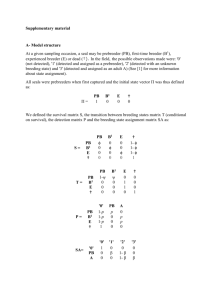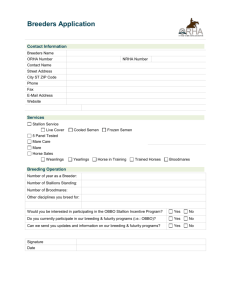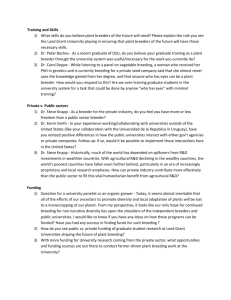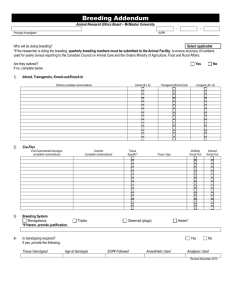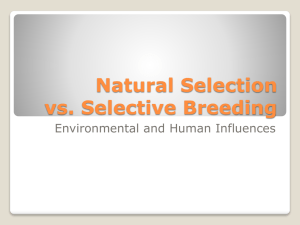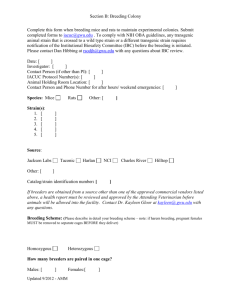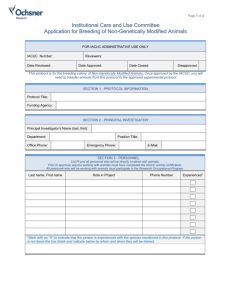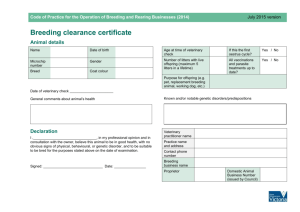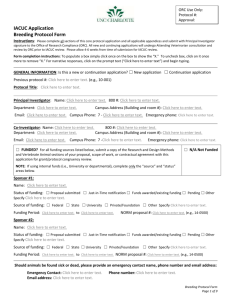Section D01 – Breeding - Office of Research Compliance
advertisement
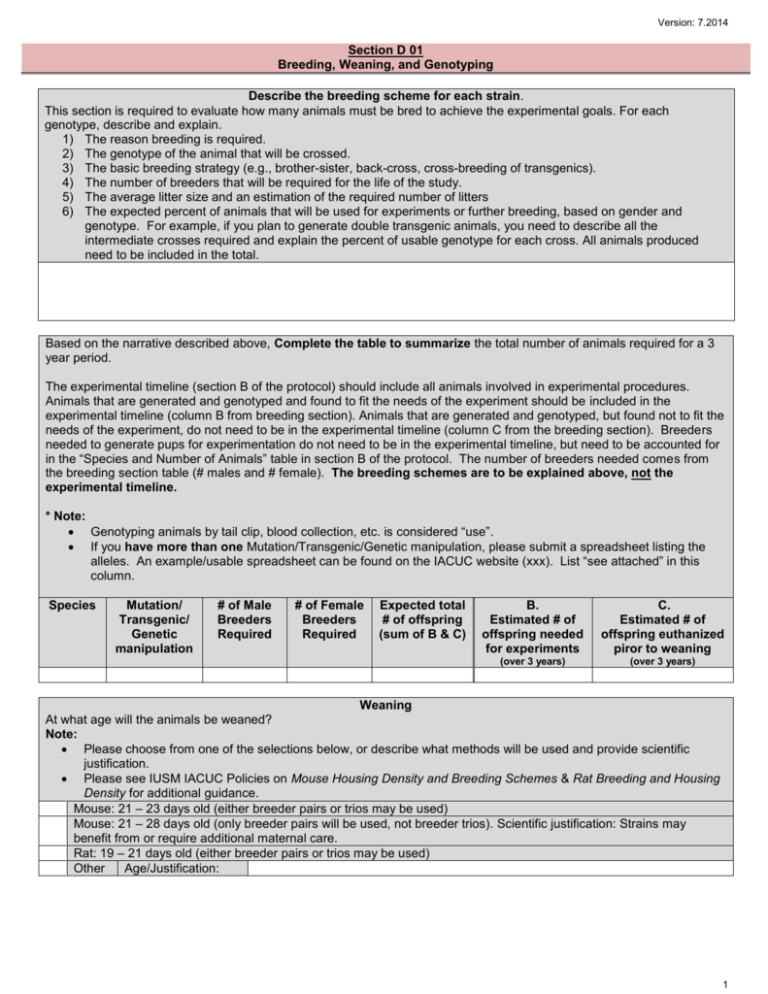
Version: 7.2014 Section D 01 Breeding, Weaning, and Genotyping Describe the breeding scheme for each strain. This section is required to evaluate how many animals must be bred to achieve the experimental goals. For each genotype, describe and explain. 1) The reason breeding is required. 2) The genotype of the animal that will be crossed. 3) The basic breeding strategy (e.g., brother-sister, back-cross, cross-breeding of transgenics). 4) The number of breeders that will be required for the life of the study. 5) The average litter size and an estimation of the required number of litters 6) The expected percent of animals that will be used for experiments or further breeding, based on gender and genotype. For example, if you plan to generate double transgenic animals, you need to describe all the intermediate crosses required and explain the percent of usable genotype for each cross. All animals produced need to be included in the total. Based on the narrative described above, Complete the table to summarize the total number of animals required for a 3 year period. The experimental timeline (section B of the protocol) should include all animals involved in experimental procedures. Animals that are generated and genotyped and found to fit the needs of the experiment should be included in the experimental timeline (column B from breeding section). Animals that are generated and genotyped, but found not to fit the needs of the experiment, do not need to be in the experimental timeline (column C from the breeding section). Breeders needed to generate pups for experimentation do not need to be in the experimental timeline, but need to be accounted for in the “Species and Number of Animals” table in section B of the protocol. The number of breeders needed comes from the breeding section table (# males and # female). The breeding schemes are to be explained above, not the experimental timeline. * Note: Genotyping animals by tail clip, blood collection, etc. is considered “use”. If you have more than one Mutation/Transgenic/Genetic manipulation, please submit a spreadsheet listing the alleles. An example/usable spreadsheet can be found on the IACUC website (xxx). List “see attached” in this column. Species Mutation/ Transgenic/ Genetic manipulation # of Male Breeders Required # of Female Breeders Required Expected total # of offspring (sum of B & C) B. Estimated # of offspring needed for experiments C. Estimated # of offspring euthanized piror to weaning (over 3 years) (over 3 years) Weaning At what age will the animals be weaned? Note: Please choose from one of the selections below, or describe what methods will be used and provide scientific justification. Please see IUSM IACUC Policies on Mouse Housing Density and Breeding Schemes & Rat Breeding and Housing Density for additional guidance. Mouse: 21 – 23 days old (either breeder pairs or trios may be used) Mouse: 21 – 28 days old (only breeder pairs will be used, not breeder trios). Scientific justification: Strains may benefit from or require additional maternal care. Rat: 19 – 21 days old (either breeder pairs or trios may be used) Other Age/Justification: 1 Version: 7.2014 Genotyping In certain cases, an animal must be genotyped prior to use. Genotyping is defined by federal policy as a “procedure”. Therefore, it must be described and approved by the IACUC. Animals that are genotyped must be reported as “used”, even if the genotype indicates the animal is not of the desired experimental construct and the animal is euthanized without further use. Genotyping is not necessary for this protocol Genotyping will be performed on tissue obtained by the method(s) defined below: Tail snipping (mice): The tail snip will be limited to 5 mm of the tail tip The tail snip will exceed 5 mm of the tail tip. Specify the maximum length of tail tip that will be taken and explain the need for the larger tissue specimen: The tail snip will be taken prior to 21 days of age The tail snip will be taken after 21 days of age. Justify the delayed genotyping and describe the anesthetic regiment to be used for the procedure. Ear punch Oral swab Blood collection Other (describe) Animal Identification Please describe how the animals will be identified after genotyping. If toe clips are used, it must be per the IACUC policy (http://researchcompliance.iu.edu/iacuc/iupui/iacuc_policies.html) and when no other individual identification method is feasible. 2
